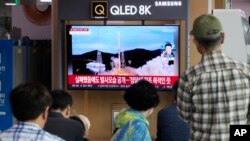China is unlikely to take any action against North Korea even if Pyongyang tries to relaunch a spy satellite after its first attempt failed, experts said.
North Korean leader Kim Jong Un's powerful sister, Kim Yo Jong, said the regime would try for the second time to launch a military reconnaissance satellite "in the near future and start its mission."
She said through North Korea's state-run KCNA on Thursday that if North Korea's satellite launch is "censured," satellites that the U.S. and other countries have launched "should be denounced."
Her statement came after North Korea's Chollima-1 satellite launch rocket malfunctioned and splashed into the sea west of South Korea on Wednesday.
It was the first time since 2016 that North Korea tried to launch a satellite. North Korea started conducting its satellite launches in 2012, which drew international sanctions.
A satellite rocket uses ballistic missile technology that can also be used as a weapon, and the U.N. Security Council (UNSC) passed multiple resolutions banning North Korea from using such technology.
The failed launch Wednesday elicited widespread condemnations from the United States and the international community.
"We're going to continue to work with allies and partners on holding Kim Jong Un and his regime accountable," John Kirby, National Security Council coordinator for strategic communications, told reporters Wednesday.
China has not joined the international community in criticizing North Korea's satellite launch. It has not condemned Pyongyang's record number of missile tests in 2022.
In response to North Korea's failed satellite launch, Chinese Embassy spokesperson Liu Pengyu in Washington said Wednesday that "the situation today is not what China wants to see."
"The only way to prevent the situation from worsening is" to recognize "the absence of a peace mechanism on the Korean Peninsula" and resume talks under "the 'dual track' approach," the spokesperson said in an email to VOA's Korean Service.
China's dual track solution involves a freeze on North Korea's nuclear weapons and missile tests and halting U.S.-South Korean military exercises while pursuing "a parallel track" of denuclearization and peace on the Korean Peninsula, according to Frank Aum, senior expert on Northeast Asia at the U.S. Institute of Peace.
Daniel Russel, who served as the assistant secretary of state for East Asian and Pacific Affairs in the Obama administration, said, "Although that will be a destabilizing and threatening escalation by North Korea, there is no basis for expecting Beijing to either prevent the launch or criticize it after the fact."
Russel said China's remark "makes absolutely no mention of the fact that the launch was an egregious violation of the UNSC resolutions that China itself helped draft, voted for, and is obliged to implement."
China, a permanent UNSC member, helped to pass existing UNSC sanctions on North Korea but has been opposing UNSC actions against the regime in recent years.
China, along with Russia, vetoed a U.S.-led a resolution in May 2022 that sought to condemn the regime's ICBM launches that year. Their veto has paralyzed the UNSC from taking unified actions against North Korea.
Joseph DeTrani, who served as the special envoy for six-party denuclearization talks on North Korea that involved China during the George W. Bush administration, said Beijing "will continue to oppose sanctions" if the UNSC tries to pass a new resolution.
According to Anthony Ruggiero, senior fellow at the Foundation for Defense of Democracies, what is more important than China's criticism or support for new sanctions is implementing current sanctions.
"Even if China says North Korean actions are violations of U.N. resolutions, those statements ring hollow" when Beijing is helping the North Koreans "get the items they need for those missiles."
Ruggiero also said that China has no incentive to pass new sanctions as North Korea's missiles and nuclear weapons are not targeted at China but at the U.S.
An official at the U.S. mission to the U.N. told VOA's Korean Service on Thursday that the U.S. is calling for an open UNSC meeting on North Korea on Friday.
Jiha Ham contributed to this story.




